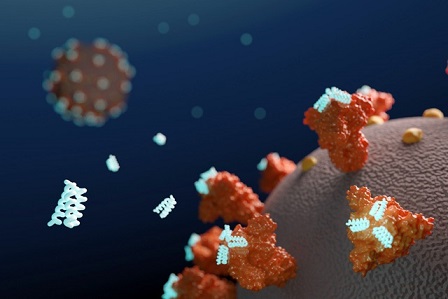University of California Study Finds That Tetraspanin-8 (TSPAN8) Is A Mediator In in SARS-CoV-2 Infections
COVID-19 News - Tetraspanin-8-TSPAN8-Mediator-SARS-CoV-2-Infections Apr 02, 2023 2 years, 9 months, 2 weeks, 5 days, 18 hours, 31 minutes ago
A new study by researchers from the University of California, San Francisco - USA has found that the human protein that Tetraspanin-8 (TSPAN8) is a mediator in in SARS-CoV-2 infections.

Tetraspanin-8 is a protein that in humans is encoded by the TSPAN8 gene. The protein encoded by this gene is a member of the transmembrane 4 superfamily, also known as the tetraspanin family. Most of these members are cell-surface proteins that are characterized by the presence of four hydrophobic domains. The proteins mediate signal transduction events that play a role in the regulation of cell development, activation, growth and motility. This encoded protein is a cell surface glycoprotein that is known to complex with integrins. This gene is also expressed in different carcinomas.
The SARS-CoV-2 virus and its variants have caused a global pandemic with varying degrees of disease severity as reported in numerous
COVID-19 News coverages and studies. The airway epithelium's role in determining these variations has been relatively understudied. This study examines airway organoids (AO) generated from adult stem cells of different individuals and investigates the role of Tetraspanin-8 (TSPAN8) in facilitating SARS-CoV-2 infection.
The study findings suggest that TSPAN8 is a conserved mediator of infection for Ancestral, Delta, and Omicron SARS-CoV-2 variants and could serve as a potential therapeutic target for controlling COVID-19 severity.
Airway Organoid Biobank and Characterization
A biobank of 20 unique airway organoids (AOs) was generated using adult stem cells from different individuals. These AOs were used to optimize viral infection with H1N1/PR8 influenza and analyze SARS-CoV-2 infection in detail. Single-cell RNA sequencing (scRNA-seq) and spectral flow analysis revealed the presence of TSPAN8, a conserved mediator of SARS-CoV-2 infection across Ancestral, Delta, and Omicron variants.
TSPAN8 as a Novel Mediator of SARS-CoV-2 Infection
Infection of AOs with SARS-CoV-2 Ancestral (WA-1) variant led to the discovery of TSPAN8 as a potential facilitator of viral infection. TSPAN8 is a transmembrane protein with four domains, organizing surface membrane proteins in a dynamic microdomain. TSPAN8 has been reported to promote the entry of multiple viruses, including influenza A virus, human cytomegalovirus (HCMV), and human papillomavirus.
The study found that TSPAN8 facilitated SARS-CoV-2 infection independently of the Spike-ACE2 interaction and was not an alternative entry receptor. Blocking TSPAN8 in AOs led to a decrease in viral load, indicating its functional role in SARS-CoV-2 infection.
Infection Characteristics of SARS-CoV-2 Variants and TSPAN8
The study investigated the infection characteristics of SARS-CoV-2 Ancestral (WA-1), Delta, and Omicron variants in the context of AOs with diverse cell-type composition. The infection rates for these variants were highest for the WA-1 variant, and all three variants displayed a clear tropism for ciliated and goblet cells. The presence of TSPAN8 in infected cells remained conserved across all variants, suggesting TSPAN8 as an attractive therapeutic target for controlling COVID-19 severity.
/>
Blocking TSPAN8 as a Potential Therapeutic Approach
TSPAN8-blocking antibodies were used to explore its potential as a therapeutic target for COVID-19. The infection levels of AOs with the SARS-CoV-2 WA-1 variant was reduced by 60% upon TSPAN8-blocking antibody treatment, further demonstrating TSPAN8's functional role in SARS-CoV-2 infection.
Conclusion
This study provides valuable insights into the role of airway epithelial responses in SARS-CoV-2 infection and the conserved role of TSPAN8 across Ancestral, Delta, and Omicron variants. TSPAN8 could serve as a potential therapeutic target for controlling the severity of COVID-19 disease. Further research is needed to validate these study findings and develop novel therapeutic strategies targeting TSPAN8.
The study findings were published in the peer reviewed journal: Cell.
https://www.cell.com/stem-cell-reports/fulltext/S2213-6711(23)00014-0
For the latest COVID-19 News, keep on logging to Thailand Medical News. 